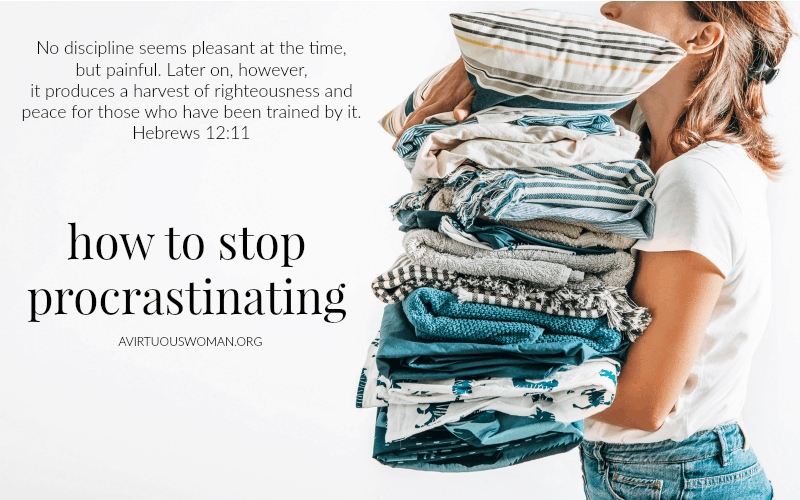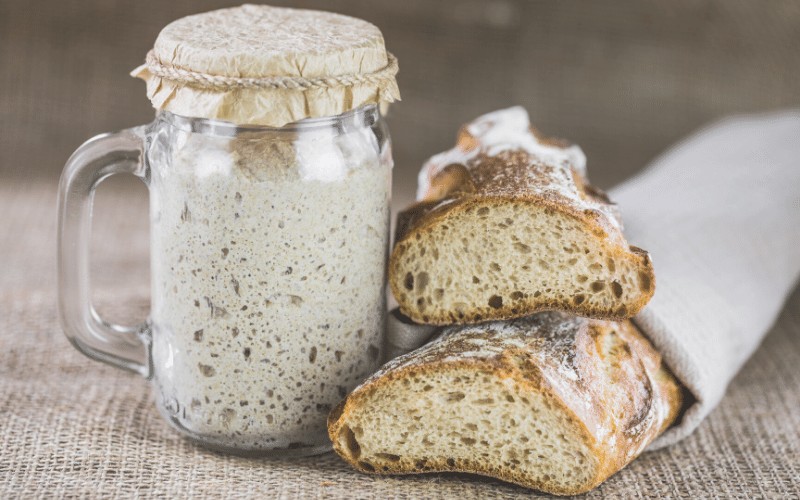How to Stop Procrastinating
Most of us realize if we have a tendency to procrastinate. Procrastination very often becomes a habit. Habits are very powerful. They can be very hard to change and deeply ingrained in your way of life. Today I’m talk about why people procrastinate and the steps to overcoming procrastination that you can take and create self discipline.

Procrastination is a funny thing. We feel like we are making life easier or more pleasurable by putting off those tasks that we don’t really want to do. Unfortunately, procrastination usually makes life harder in the long run.
It’s a lot more fun to go watch television and escape the reality of the moment – that you have a sink full of dishes that need washing. It’s a lot more fun to go shopping to buy new pretty things than it is to clean out that closet that is so full the door barely shuts. Or it feels more pleasurable to go crawl into bed at the end of a long day than to clean the kitchen.
Procrastination is the thief of time. – Edward Young
Edward Young, a mid 18th century poet once said that “Procrastination is the thief of time,” meaning that a person who puts off doing what he needs to do until the last minute will achieve very little.
Why do people procrastinate?
If you are aware of your tendency to procrastinate, then you may think that deep down the source of your procrastination is laziness, disorganization, or that you really don’t care enough to follow through.
And if you have tasks that are causing you stress, you may be feeling anxiety about procrastinating. You may be feeling guilty. And your overwhelmed feelings may paralyze you so much that you simply don’t know where to begin.
It’s time to forgive yourself and move forward.
Forgiveness is a powerful, powerful action and a necessary emotion. When you’ve felt like a failure as a homemaker for a long time, you probably have a lot of bad feelings associated with homemaking. Feelings like: shame, anxiety, stress, frustration, and hopelessness.
In order for you to change, you have to forgive yourself of your past mistakes. You also need to give yourself grace. Grace says, “I know I made mistakes, but I did the best I could given my circumstances and knowledge at the time.”
When we know better, we do better.
The past is the past. Let’s leave it there.

Steps to Overcoming Procrastination
Procrastination very often becomes a habit. And habits are very powerful. They can be very hard to change and deeply ingrained in your way of life. Most people procrastinate on some level and in different areas of life.
The Bible says, “No discipline seems pleasant at the time, but painful. Later on, however, it produces a harvest of righteousness and peace for those who have been trained by it.” Hebrews 12:11 NIV.
So in other words, self discipline may feel painful at the time, but it has it rewards if you stick with it! There are four steps to overcoming procrastination that you can take to create self discipline:
#1 Pray. If things have gotten so far out of control that you don’t know what to do, let’s being by praying and asking God to help you face your fears and tackle the overwhelm.
#2 Identify a bad habit you have. For instance, you often go to bed with a messy kitchen and wake up feeling discouraged by the mess.
#3 Replace the bad habit with a new little habit. So, for instance, you usually go to bed with a messy kitchen. Commit to loading the dishwasher after supper every night.
You want the new habit to be small enough that you can accomplish the task in a short amount of time. So, loading the dishwasher would be a good habit to start with. You don’t have to clean the whole kitchen if that is overwhelming or discouraging. Just load the dishwasher or wash your dishes in the sink.
#4 Repeat. Once you have established your little habit as something you do most days without fail you can add in a new little habit.
It’s interesting that bad habits are often harder to give up than good habits. And changing bad habits requires you to feel motivated to do it.
Do you wake up in the morning feeling discouraged? Does homemaking make you feel like a failure? How badly do you really want to change?
Are you willing to do the work required to change? Change can be painful. It means you have to really take a hard look at your current habits and access the areas of your life you need to work on.
Creating a disciplined life isn’t easy, but it is possible.
But you have to want it. You have to be willing to do the work of transforming your life. I would never tell you it’s easy. In fact, creating good habits where bad habits have accumulated like clutter on the dining room table requires determination, discipline, and the decision to make those changes a priority.
With God at the center and with new little habits, creating a disciplined life is possible!
Self Discipline at Home
There are several reasons why you may feel overwhelmed at home and why homemaking makes you feel like a failure. Some of these might include:
- too much stuff or clutter, piles of paper, overflowing closets, messy rooms
- too many outside activities, too many commitments leave you feeling stretched too thin
- not managing your time well, running late, forgetting appointments,
- allowing family members to make messes without cleaning up, not teaching kids to be neat
- you haven’t set up routines to help you get things done, procrastinating housework
All of these require self discipline to change.
- If you have too much stuff, you need self discipline to change your shopping habits and declutter your home for good.
- If you are so busy you don’t have time to do even basic housekeeping, you need self discipline to help you decide what activities to participate in and which ones to decline.
- If you are not managing your time well, you need self discipline to go to bed on time and wake up on time and complete your tasks when they need to be done.
- If you allow your children to make huge messes and fail to clean them up by the end of the day, you need self discipline to help train your children to create better habits.
- If you haven’t set up consistent routines at home, you need self discipline to create new habits and systems that will help you maintain a reasonably neat and tidy space most of the time.
Overcoming procrastination requires a level of self discipline. You need to be disciplined to create good habits whatever they are.
The good news is that self discipline can be learned and that if we ask Him, the Spirit of God will help us cultivate a heart of self discipline!
People who are self disciplined don’t allow emotions or feelings to dictate their actions. One study showed that self discipline was even more important in determining success than IQ. According to the APA’s website:
We have many common names for willpower: determination, drive, resolve, self-discipline, self-control. But psychologists characterize willpower, or self-control, in more specific ways. According to most psychological scientists, willpower can be defined as:
- The ability to delay gratification, resisting short-term temptations in order to meet long-term goals.
- The capacity to override an unwanted thought, feeling or impulse.
- The ability to employ a “cool” cognitive system of behavior rather than a “hot” emotional system.
- Conscious, effortful regulation of the self by the self.
- A limited resource capable of being depleted.
In order to develop better self discipline – whether it’s being on time for work, keeping your bathrooms clean, meal planning, keeping a tidy house, or training your children – you need to replace the old habits with new and change your thought patterns from negative to positive.
It takes practice and won’t happen overnight. Having a friend or partner to hold you accountable to making change happen is very beneficial as well.
Unfortunately, for many of us, instead of being disciplined we find ourselves procrastinating instead of doing chores – or we don’t manage our time efficiently.
Establishing good habits is the key to overcoming messiness. And good habits begin with self-discipline.
“For the Spirit of God… gives us self discipline.” 2 Timothy 1:7
But, the Spirit of God will give us self discipline if we just ask! Isn’t that good news? Of course, you have to be willing to do the work of changing. But the Bible also tells us that all things are possible with God!
The Disciplined Homemaker
What if you didn’t have to feel overwhelmed anymore? What if you could create a life of self discipline that brings order and peace to your home?
If you often feel discouraged and overwhelmed by homemaking, then you probably lack self-discipline in some areas of your life.
Having self discipline basically means that you do what you know needs to be done even when you don’t feel like it. You may be disciplined in some areas of your life and need some improvement in others. The good news is that it is possible to cultivate a heart of discipline.
Learn more about The Disciplined Homemaker – a six week course to help you cultivate a heart of discipline at home. Enrollment is currently open!!
Free Printable Bible Study Guide

How to Download
Learn what the Bible says about self discipline and think about what God speaking to your own heart in this free printable 5 day Bible study. Just fill out the form below.
Cultivating a Heart of Discipline

Join A Virtuous Woman's community of over 21,000 women where you'll find freedom from perfection and the confidence to live your life with purpose. Get my FREE BIBLE STUDY GUIDE: Cultivating a Heart of Discipline at Home!






